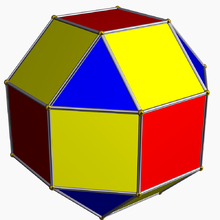
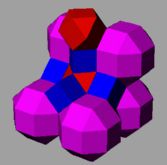
In geometry, a cantellation is a 2nd-order truncation in any dimension that bevels a regular polytope at its edges and at its vertices, creating a new facet in place of each edge and of each vertex. Cantellation also applies to regular tilings and honeycombs. Cantellating a polyhedron is also rectifying its rectification.
Cantellation (for polyhedra and tilings) is also called expansion by Alicia Boole Stott: it corresponds to moving the faces of the regular form away from the center, and filling in a new face in the gap for each opened edge and for each opened vertex.
Notation
A cantellated polytope is represented by an extended Schläfli symbol t0,2{p,q,...} or r or rr{p,q,...}.
For polyhedra, a cantellation offers a direct sequence from a regular polyhedron to its dual.
Example: cantellation sequence between cube and octahedron:
Example: a cuboctahedron is a cantellated tetrahedron.
For higher-dimensional polytopes, a cantellation offers a direct sequence from a regular polytope to its birectified form.
Examples: cantellating polyhedra, tilings
| Form | Polyhedra | Tilings | |||
|---|---|---|---|---|---|
| Coxeter | rTT | rCO | rID | rQQ | rHΔ |
| Conway notation |
eT | eC = eO | eI = eD | eQ | eH = eΔ |
| Polyhedra to be expanded |
Tetrahedron | Cube or octahedron |
Icosahedron or dodecahedron |
Square tiling | Hexagonal tiling Triangular tiling |
| Image | 
|

|
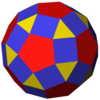
|
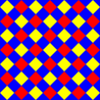
|

|
| Animation | 
|

|

|
||
| Coxeter | rrt{2,3} | rrs{2,6} | rrCO | rrID |
|---|---|---|---|---|
| Conway notation |
eP3 | eA4 | eaO = eaC | eaI = eaD |
| Polyhedra to be expanded |
Triangular prism or triangular bipyramid |
Square antiprism or tetragonal trapezohedron |
Cuboctahedron or rhombic dodecahedron |
Icosidodecahedron or rhombic triacontahedron |
| Image | 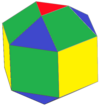
|

|

|
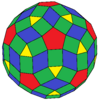
|
| Animation | 
|

|
See also
References
- Coxeter, H.S.M. Regular Polytopes, (3rd edition, 1973), Dover edition, ISBN 0-486-61480-8 (pp.145-154 Chapter 8: Truncation, p 210 Expansion)
- Norman Johnson Uniform Polytopes, Manuscript (1991)
- N.W. Johnson: The Theory of Uniform Polytopes and Honeycombs, Ph.D. Dissertation, University of Toronto, 1966
External links
This polyhedron-related article is a stub. You can help Misplaced Pages by expanding it. |
 or rr{p,q,...}.
or rr{p,q,...}.
